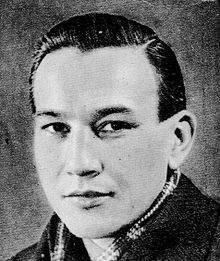Teuvo Tulio
His parents' marriage was brief, and he spent the early part of his childhood in rural Latvia with his grandparents while his mother pursued a career as a ballerina in St. Petersburg.
Both were students at Helsinki's Russian-language Tabunov School and both were avid cinema goers who were fans of Charlie Chaplin and adventure films.
[1] In 2008 and 2009, short retrospectives of his work were held in the United States at the Brooklyn Academy of Music and the Pacific Film Archive.
Covering the former for the Village Voice, film critic J. Hoberman wrote: "At once arty and artless, stark and fulsome, Cine Tulio is characterized by an exaggerated emotional intensity and an equally primal lack of self-consciousness ... His movies are desperate and insistent, sometimes clumsy but never less than forceful.
"[1] In a brief essay on the filmmaker for the English-language film website The Auteurs, Anna Bak-Kvapil referred to Tulio's work as "spectacles of suffering and sex,"[3] writing: "His style can be Eisensteinian, with expressionistic montages of the shining faces of the proletariat intercut with kittens, crucifixes, or half-smoked cigarettes, but he adores Hollywood, mimicking in his own over-enthusiastic way, Cukor, Lubitsch and Von Sternberg.

